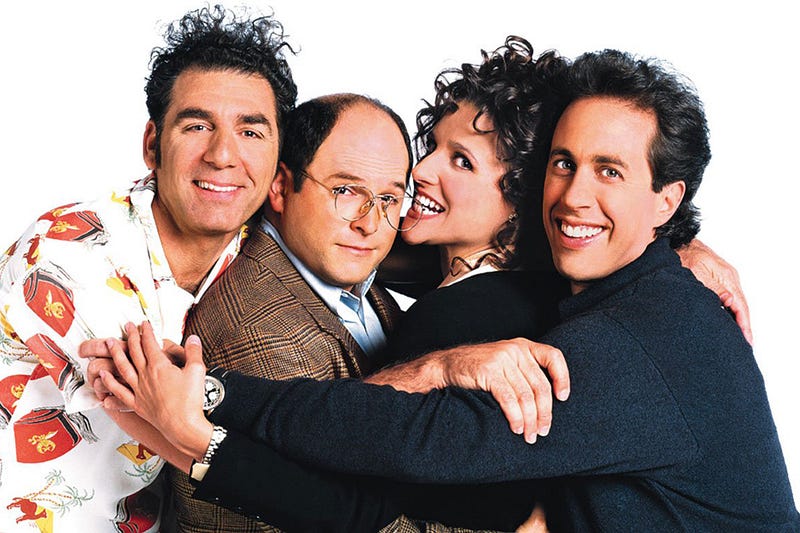
For the last four years, I’ve indulged a guilty pleasure: watching television shows from the 80’s and 90’s. Everything from Cheers and Frasier to Seinfeld, Friends, and lately, The Golden Girls.
I felt cynical about this habit for the first few months, especially since I’d vetoed Fuller House before it even landed its first season on Netflix. Where was our commitment to art and originality, I’d mused self-righteously? Yet I’d become one of those nostalgic people I’d already judged. I rolled my eyes at myself.
But after coming up for air after an extended bout of postpartum anxiety several years ago, I realized there was more to this habit than simple sentiment.
I was in junior high and high school in the 90’s, and I remember well the faux angst of the Cranberries and Alanis Morissette, the portrayal of troubled youth from the coming of age film, Empire Records. We had problems back then, but not real problems. At least not in the United States.
There were distant problems, in Bosnia or Rwanda, and without the 24 hour news cycle, it lacked tangibility. The US fixated on the potential impeachment of a president who had an affair while in office, and that was one of the worst things we could come up with. School shootings were rare — Columbine horrified the nation.
And then 9/11 happened. Many of us in the United States refer to this event as one of those that splits time in half: before 9/11 and after 9/11.
From that point, the fear other nations regularly felt from threats at their borders was ours to feel as well. And not just fear: terror. This was new for us in the US.
In 2004, the world met Facebook, and three years later, Steve Jobs introduced iPhone. The world, in all its terror and beauty, was suddenly accessible to us at all times. Our utopian dream of being perpetually connected realized, we discovered it was no utopia at all.
It was the best and worst of humanity released upon us, armed with cameras and editing software. Now, the truth could be anything, anywhere, anyone.
It is impossible to know how connectivity and rapid fire, technological advancements affect our current age of terror, which one comes first or how to stop it. But I know we all want a break.
Our minds have not yet evolved to overcome the trance-like state that falls on us as we scroll through social media, our willpower overtaken with a subconscious mix of dopamine and adrenaline.
The options we craved have become our oppressor. The knowledge of the world, along with its resulting empathy, pries our eyes open with fear and a sense of responsibility that we must do something. Something about Syria, something about Nicaragua, something about the latest devastating natural disaster. Our concern spread wide and not deep, we cannot do much that is meaningful, yet we feel compelled to assuage our guilt through faux activism and microscopic donations or tweets into the ether.
Now, because we can be anywhere and know anything, we are nowhere. And we know nothing. We do not know who to trust. All news might be fake news. And knowledge itself is relative.
In some ways, returning to the 90’s is not a lack of imagination but a longing for a simpler time, a time when we were not distracted, tempted, entranced beyond our willpower. Before we held access to the world in our hands, a responsibility and burden far too great for any human soul to carry, we held books and newspapers in our hands. We were given the gift of attention, although we didn’t know it then. There were no pop-ups or message banners dropping into our window of attention, tempting us to switch and swipe back and forth, thousands of times a day.
What I saw in front of me was all there was. The gift of focus was mine to take for granted. And I did.
I watch Friends, Seinfeld and Frasier to remember what life looked like before we differentiated between analog and digital. Because analog was simply what we called life.
Now, I buy books so I can hold them in my hands. I subscribe to the newspaper, tossed into my driveway daily at 4pm, because I want to offer myself fewer choices. I write with a pen in a journal because, although typing is faster, my brain needs to process my inner world as humans have for thousands of years: through the (actual) written word.
Like you, I watch these television shows to remember a humanity I am desperate not to forget, a life, a set of habits and the gift of focus and willpower I want to pass on to my children.
I don’t want The Algorithm to decide what I care about, think about, buy and sell, who I meet and who my friends are. I want to decide my own life, and the only way to do that is to set the phone down and look up, to look at my children and my husband, the coffee in my mug and the words on my page, and feel and see and smell the real world in front of me.
And chances are, if I can see it, hear it, touch it, it’s all that matters anyway.

